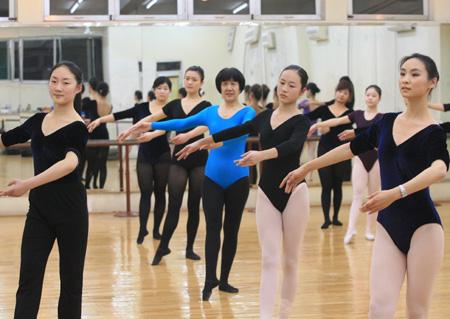 Students practice their skills at a dance studio in Shanghai. Every weekend, young people meet to learn flamenco and other intricate dances. [Asianewsphoto]
Students practice their skills at a dance studio in Shanghai. Every weekend, young people meet to learn flamenco and other intricate dances. [Asianewsphoto]It's a dark time for the global economy, and some people choose to dance the night away.
Jennifer Lin is among the dancing fans. After practicing flamenco for more than three years, the 35-year-old accounting manager quit her job at a foreign company in Shanghai and in May set up her own flamenco studio called Camino, which means "road" in Spanish.
"We have seen the circle of flamenco fans in Shanghai develop from none to around 50 over the past three years, and learned that more white-collar workers are dancing as an emotional outlet for stress," Lin said.
"Dancing, as an effective way to deliver expression and physical exercise, is becoming more popular," she said.
Every weekend, more than 10 students - mostly young, female and white-collar - punctually appear in Lin's 40-sq-m studio located in a quiet park along Kaixuan Road. At the studio, they practice the rapid and intricate steps of flamenco.
"It fits the fast-paced city life of Shanghai, and has attracted more and more practitioners," Lin said.
Wang Wei, 25, a fashion designer, was among the studio's first students.
"I was stunned by flamenco -- from the upbeat music to the clothes in bright colors. It has become a major part of my leisure time and a good escape from my work stress," Wang said.
Wang squeezed 600 yuan ($87.89) from her 3,000-yuan monthly salary to take lessons. That's after paying more than 1,500 yuan a month for rent.
"It's worth the money. I will keep on learning from the very beginning level to the mid- or even higher levels," Wang said.
That Camino's opening ceremony held in a small pub in early June attracted more than 200 people was not a big surprise to Lin.
Participants in colorful, flamenco-styled clothes packed Lin's small studio.
"All were coming by word of mouth. Obviously, people are starting to pursue more than material things now. Exotic dances have turned up the heat in Shanghai," Lin said.
Salsa beat
Wang Yi, a friend of Lin who runs a Latin studio that has been teaching salsa and bachata dances since late 2007, can't agree more.
"It was almost a barren land for Latin dancing five years ago in Shanghai, but now there are at least four professional studios solely teaching salsa," Wang Yi said.
His J&L Dance Club has recently added two more classes to the current schedule of three a week because of soaring demands.
His club also has had to set a maximum number of 10 students per class to give more attention to each dancer. Still, some classes number as many as 15 due to the insistence of students.
"I have a lot of friends who like salsa dancing. In our eyes, it means fashionable and modern. It's also a good way to know more people," said a student in the studio surnamed Sun.
Abi Wang, 27, who works for a venture capital firm, said it's also a good way to establish social networks.
"Many of my foreign friends favor salsa, so it's good to learn some," Abi said.
With a workload that has decreased due to the financial crisis, she also has more time now to take dancing lessons, she said.
Even though Wang Yi's studio charges 350 yuan per hour for classes, he still receives "plenty of requests" from high earners in Shanghai.
Wang said he even had a student who paid more than 8,000 yuan once for a private class just for fun.
Dance shows
"People in the city are open-minded and willing to pay a lot of money to learn something new," he said.
Wang Yi said that's probably why Wulin Da Hui is becoming all the rage in Shanghai.
Wulin Da Hui, which literally means dance battle, is a Shanghai Media Group television show featuring a Latin-themed dance competition.
Well-known celebrities are among the participants on the show that has had an audience share of 16 percent since the show began airing in 2006. That's the highest rating among Shanghai Media Group entertainment programs since 2000.
The popularity of the show increased participation by 40 percent at a dance school run by the television show's art director, Fang Jun.
Wang Yi said there is still room for growth in the booming market for Latin dance lessons in Shanghai.
"Nobody knows how large the market will become," Wang Yi said.





